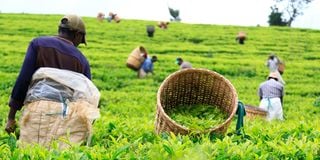Kenya tea value chain for audit on high production costs

Workers pick tea leaves. There is growing concern that rising input costs are eroding farmers' incomes.
The value chain in Kenya's tea sector is set for a special audit amid growing concerns about high costs that are wiping out farmers’ earnings.
The industry regulator, the Tea Board of Kenya (TBK) said the audit will establish the cost parameters along the value chain including farms, manufacturing, and trade.
“The cost of production of Kenya tea is considered high when compared to other tea-producing countries. This is causing uncertainty in the future of tea farming in Kenya. The cost of producing a kilo of made tea in Kenya averages at Sh130” the regulator said in a tender call for a consultant to review the production cost in the tea sector.
“Despite the key role played by the tea sector, this sector has been under threat due to ever-escalating costs of production in terms of labor costs, energy costs, factory maintenance costs, logistic costs taxation, and general expenses associated with tea making,” the board said.
Tea remains a major forex earner for Kenya despite a tough economy. Kenya’s earnings from tea exports grew 13.54 percent in the fight eight months of this year to Sh120.13 billion, Kenya National Bureau of Statistics data shows. The growth was largely helped by a weaker shilling against major international currencies, with data showing volumes of tea exports remained flat.
A report by TBK further showed that the tea industry has been the top earner of foreign exchange for the last five years contributing 26 percent of the value of the country’s total exports.
“However, the average export price of tea, which has stagnated at about $3 per Kg since 2011, suffered a 30 percent decline and averaged $2 in 2019. Growers remain the most affected within the value chain leading to dwindling earnings from tea earnings that are not able to meet their social economic needs” the regulator said.
“Little has been achieved in value addition as a means of boosting earnings for the growers in Kenya, as Kenya tea continues being sold in blended form thereby losing its identity and the advantage of fetching high price as an origin tea” it added.
TBK further said that the visibility of Kenyan tea is low as brand owners in the export markets who package the teas in their brands, rarely denote the origin of the teas, which would otherwise help promote consumer awareness of Kenya as a producer of quality teas.
“In the recent years, tea farmers have been experiencing declining returns which has majorly been occasioned by increasing cost of production. In particular, the smallholder tea farmers have often complained of high capital and operation costs as compared to their peers in the large or independent tea producers” it said.
“These high costs have in turn reduced the payout to farmers thus necessitating a comparative analysis of costs being incurred at each level of production by these industry players in order to provide an objective basis of controlling costs, especially in the smallholder tea subsector,” it said.
The regulator said the scheduled audit would help to safeguard the gains in the industry and secure public interest, especially in the smallholder tea farmers.
“There is a great need to undertake interventions which will reduce the cost of production and increase net farm level returns. To achieve this, the Tea Board of Kenya will engage a consultant to do a study on gross margin analysis in the tea industry and use the findings to address the concerns that have been impacting on the tea growers’ earnings” it said.




